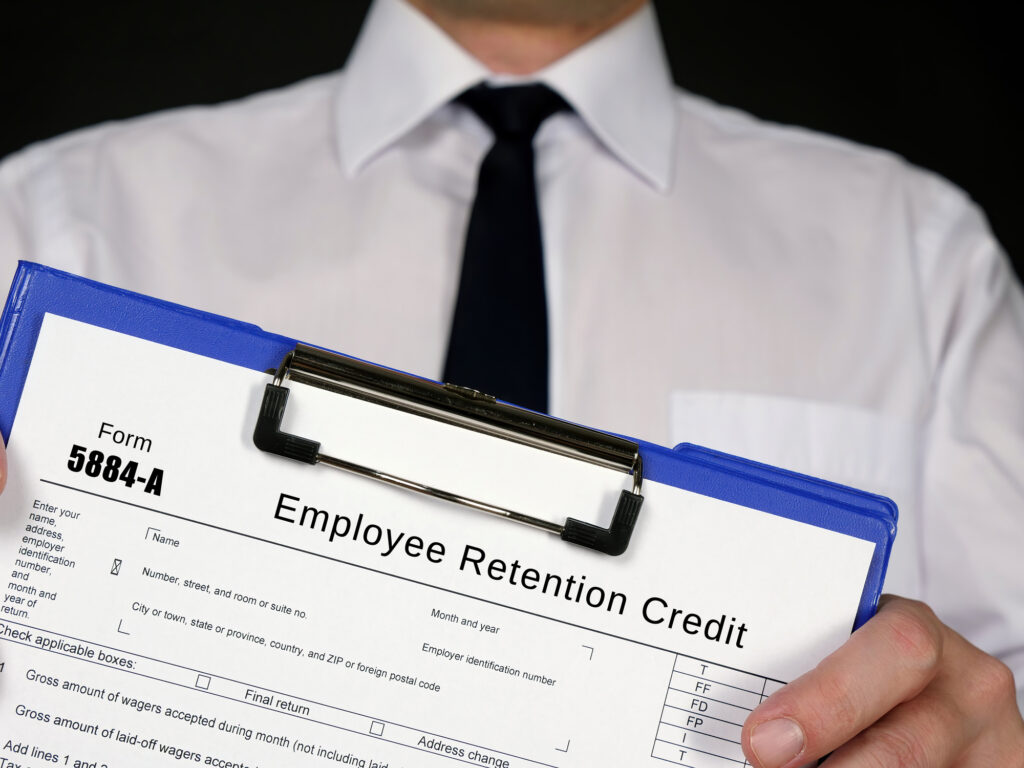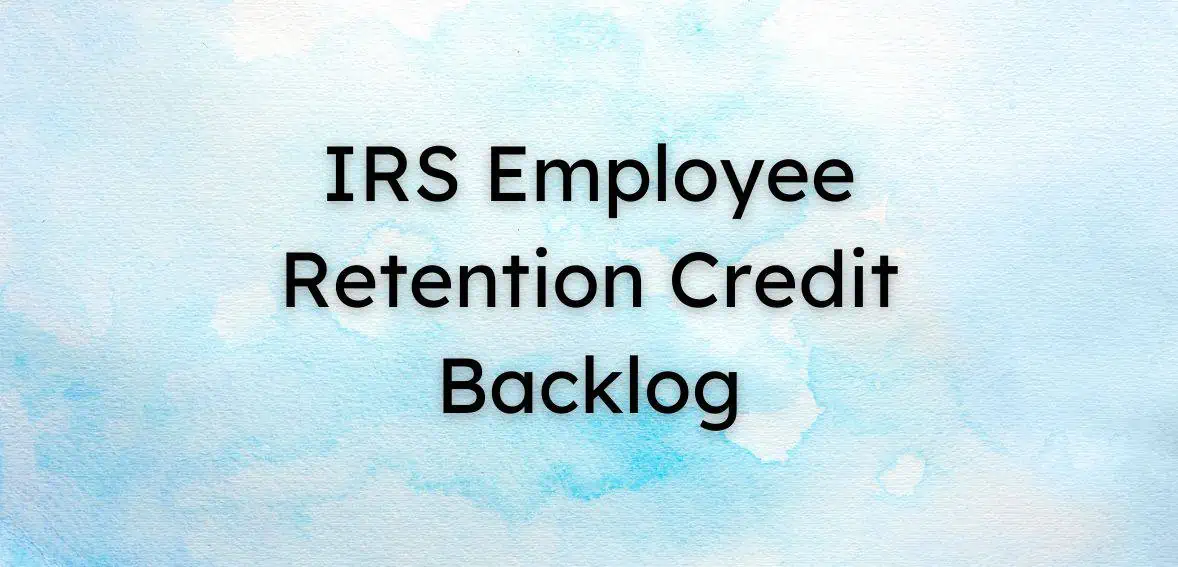If you find yourself among the small business owners anxiously awaiting the processing of your Employee Retention Credit (ERC) claim, you’re part of a sizable group facing the same frustration. The current scenario depicts a staggering Employee Retention Credit backlog of more than a million unprocessed ERC claims! As of the end of November 2023, there are 1.01 million backlog creating substantial delays for businesses in dire need of financial relief.
Expressing concern over this dire situation, Senator Gillibrand took action on May 4th by addressing IRS Commissioner Danny Werfel. She underscored the urgency of the matter and urged Commissioner Werfel to provide a comprehensive update on the IRS’s efforts to tackle this colossal backlog. The growing impatience among small business owners is mirrored in Senator Gillibrand’s proactive approach to ensure accountability and transparency in the resolution of this critical issue.
The magnitude of the backlog raises questions about the IRS’s handling of the ERC program on multiple fronts. Not only did the IRS fall short in promoting the program as directed by the Treasury Department, but it also stumbled in timely and adequate guidance issuance.
Key Takeaways:
- Unprecedented Backlog: The IRS Employee Retention Credit (ERC) backlog has reached a record-breaking one million unprocessed claims as of November 2023, causing substantial delays for small businesses seeking financial relief.
- Challenges in Program Administration: The backlog raises questions about the IRS’s handling of the ERC program, highlighting shortcomings in promoting the program and issuing timely guidance. The administration faced hurdles in reviewing claims, processing, and timely refund issuance, impacting businesses dependent on the ERC during the pandemic.
- Crisis Mitigation Efforts: The IRS responded to a surge in questionable claims by freezing new ERC claims in September 2023. Mitigation efforts include a withdrawal program, voluntary disclosure program, and ongoing handling of claims submitted before the freeze, despite extended processing times due to a significant number of illegitimate claims.
- Root Causes and Legislative Proposals: The backlog is attributed to staffing challenges, underfunding, and outdated technology. Legislative proposals aim to address these issues, including prohibitions on contingency fees for preparers, additional penalties for ineligible claims, and an extension of the statute of limitations. The IRS is incorporating scanning technology to expedite processing and seeking congressional support for enhanced enforcement against fraudulent claims.
Background Of Employee Retention Credit

The ERC made its debut in March 2020, aiming to incentivize employers to retain their workforce during the pandemic. Eligibility for the credit extends until the close of 2021 unless legislative changes intervene. Businesses that qualify, including those that secured a PPP loan, can potentially claim up to 50% of qualified wages, encompassing eligible health insurance expenses. Notably, the Consolidated Appropriations Act (CAA) brought about an expansion of the ERC, allowing eligible employers in 2021 to claim a credit of 70% on qualified wages.
While the ERC’s original intent was commendable—supporting businesses through the pandemic by promoting employee retention—but the IRS has encountered challenges across various facets of the program. It struggled to promote the program as directed by the Treasury Department, falling short in issuing timely and accurate guidance. The establishment of proper procedures to review claims proved to be another hurdle. Presently, there are issues in processing claims and issuing refunds, highlighting a series of shortcomings in the administration of the program.
Employee Retention Credit Backlog Crisis At All-Time High

Due to a notable influx of questionable ERC claims, the IRS took the step of freezing the processing of any new ERC claims in September 2023. In response, the IRS introduced a withdrawal program and a temporary voluntary disclosure program to assist taxpayers who might have inadvertently made an inaccurate claim.
During recent addresses to Congress and a tax conference hosted by the Bar of Washington DC, the IRS Commissioner conveyed that there is currently no specific timetable for lifting the moratorium on processing ERC claims received on or after September 14, 2023. While the IRS is actively handling ERC claims submitted before this date, the Commissioner acknowledged extended processing times due to the substantial number of illegitimate claims. Notably, the majority of ERC claims under review were filed in the three months leading up to September 14, 2023.
The annual report from the NTA sheds light on the ongoing challenges faced by taxpayers in determining ERC eligibility since its inception. The IRS, grappling with both the volume and complexity of the law, has found it challenging to keep up with claims. This has, unfortunately, given rise to numerous scams encouraging businesses to claim credit without due regard to eligibility.
As of the end of November 2023, the backlog of unprocessed Forms 941X at the IRS, primarily representing ERC claims, reached a staggering 1.01 million. This figure marks the highest backlog since the IRS began reporting volumes in 2021, with an increase of nearly 300,000 since the ERC processing moratorium was announced on September 14.
The processing of ERC claims by the IRS has faced significant challenges since the credit’s inception, leading to delays with potential repercussions. Legitimate claims by employers are subjected to extended wait times, potentially causing financial hardships. The IRS is working to distinguish valid claims from those deemed ineligible or potentially fraudulent.
What Is The Reason For This Influx?
Senator Gillibrand attributes the backlog in ERC processing to staffing challenges, chronic underfunding, and outdated technology in a letter addressed to Commissioner Werfel. ERC claims are submitted using Form 941X, specifically the Adjusted Employer’s Claim for Refund or Quarterly Federal Return. Presently, only a paper version of Form 941X is available, and submission is limited to mail, with no electronic filing option. Consequently, each claim requires manual processing, a task managed by only two processing locations.
A September 2022 report from the TIGTA identifies recent legislative changes through the passage of the IIJA Act as a primary contributor to the backlog. The IIJA Act altered certain processes for claims related to recovery startup businesses. However, as outlined in TIGTA’s report, the IRS lacked procedures to verify recovery startup businesses and effective controls to disallow the ERC for non-recovery startup businesses.
Addressing the Challenges and Advancements in ERC Processing

The IRS has incorporated scanning technology to automate the transcription of information that was previously manually entered, successfully digitizing around 1/3 of the ERC return backlog.
The IRS Commissioner has urged Congress to pass legislation aimed at bolstering enforcement against illegitimate ERC claims. The proposed legislation comprises three key elements:
- Prohibiting ERC preparers from charging fees based on a percentage of the claimed ERC amount. The IRS asserts that contingency fees create incentives for preparers to improperly inflate ERC amounts. On the other hand, ERC preparers argue that contingency fees provide greater access to ERC claims as employers may face challenges paying upfront preparation fees.
- Empowering the IRS to impose additional penalties on preparers responsible for ineligible ERC claims. This measure aims to penalize preparers, especially those from ERC “mills,” who may mislead customers by providing advice contrary to their regular tax preparers’ recommendations, as highlighted by North Carolina Senator Thom Tillis.
- Extending the statute of limitations on assessment for ERC claims filed in 2020 and the first two quarters of 2021 from three years to five years. This mirrors a previous extension Congress granted for ERC claims filed in the third and fourth quarters of 2021, also extending the statute of limitations from three to five years.
Additionally, the IRS National Taxpayer Advocate (NTA) is advocating for expedited processing of ERC claims. The NTA’s yearly report to Congress reveals a significant backlog, with approximately 45,000 ERC claims per week received during the two-month period around the start of the moratorium. However, the IRS processed only about 150 claims per week during the same period, resulting in this influx of unprocessed claims, which is projected to rise to nearly 1.3 million by February.
Conclusion
The IRS Employee Retention Credit (ERC) backlog has reached an unprecedented milestone, surpassing one million unprocessed claims as of November 2023. This staggering figure has raised serious concerns among small business owners eagerly awaiting financial relief. Senator Gillibrand’s proactive engagement highlights the urgency of addressing this crisis, emphasizing the need for accountability and transparency in the IRS’s efforts to tackle the colossal backlog.
The backlog crisis underscores multiple challenges in the administration of the ERC program, from the IRS’s failure to effectively promote and guide the program to issues in processing claims and issuing timely refunds. Small businesses, dependent on the ERC for survival during challenging times, face prolonged wait times and financial hardships due to this bureaucratic tangle.
Efforts to address the backlog include a freeze on new ERC claims, the introduction of withdrawal programs, and a temporary voluntary disclosure program. Legislative proposals aim to enhance enforcement against ineligible claims, empower the IRS to penalize preparers and extend the statute of limitations. Despite these measures, the backlog persists, prompting urgent calls for improved processing efficiency and transparency in handling ERC claims.

